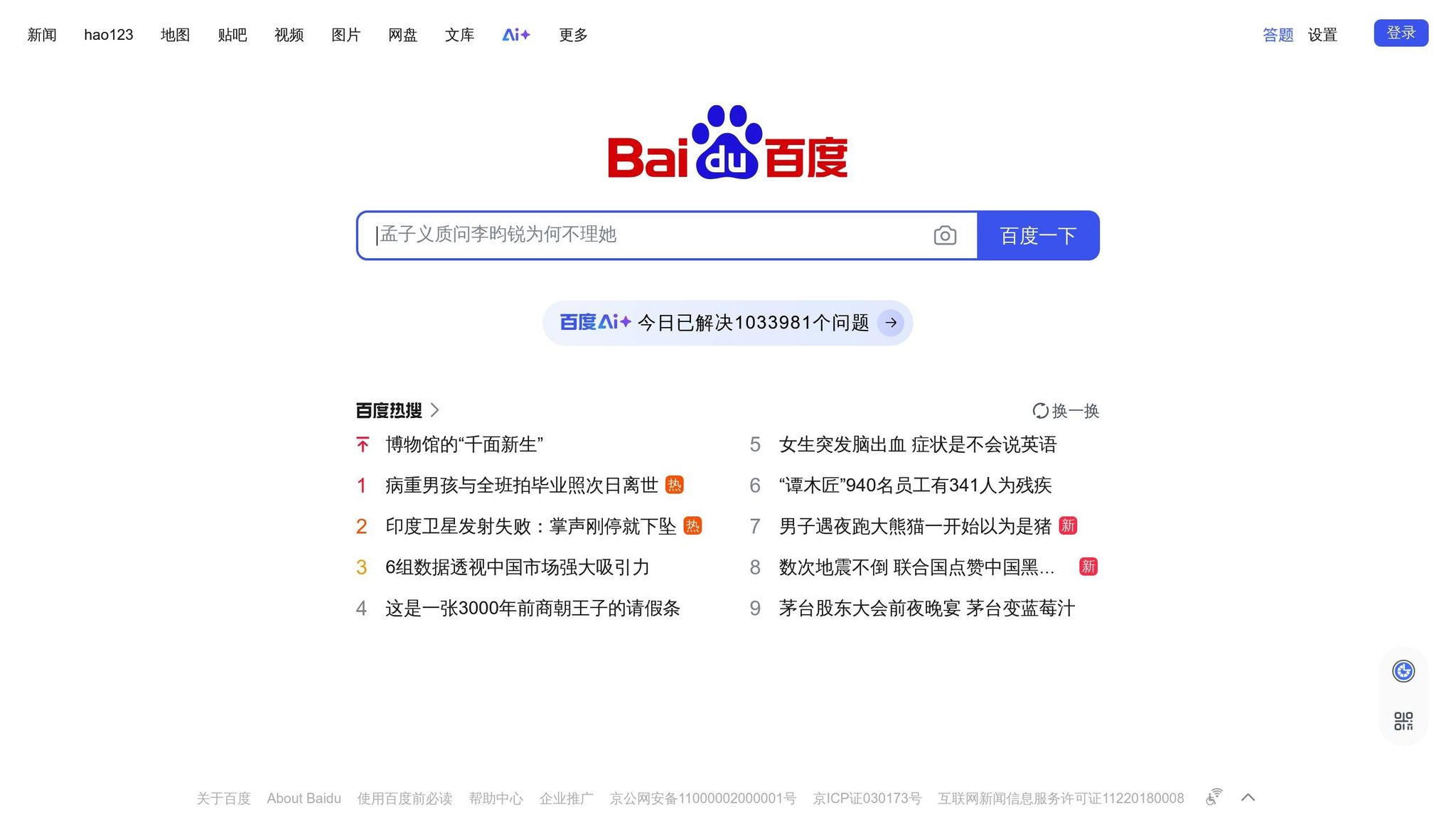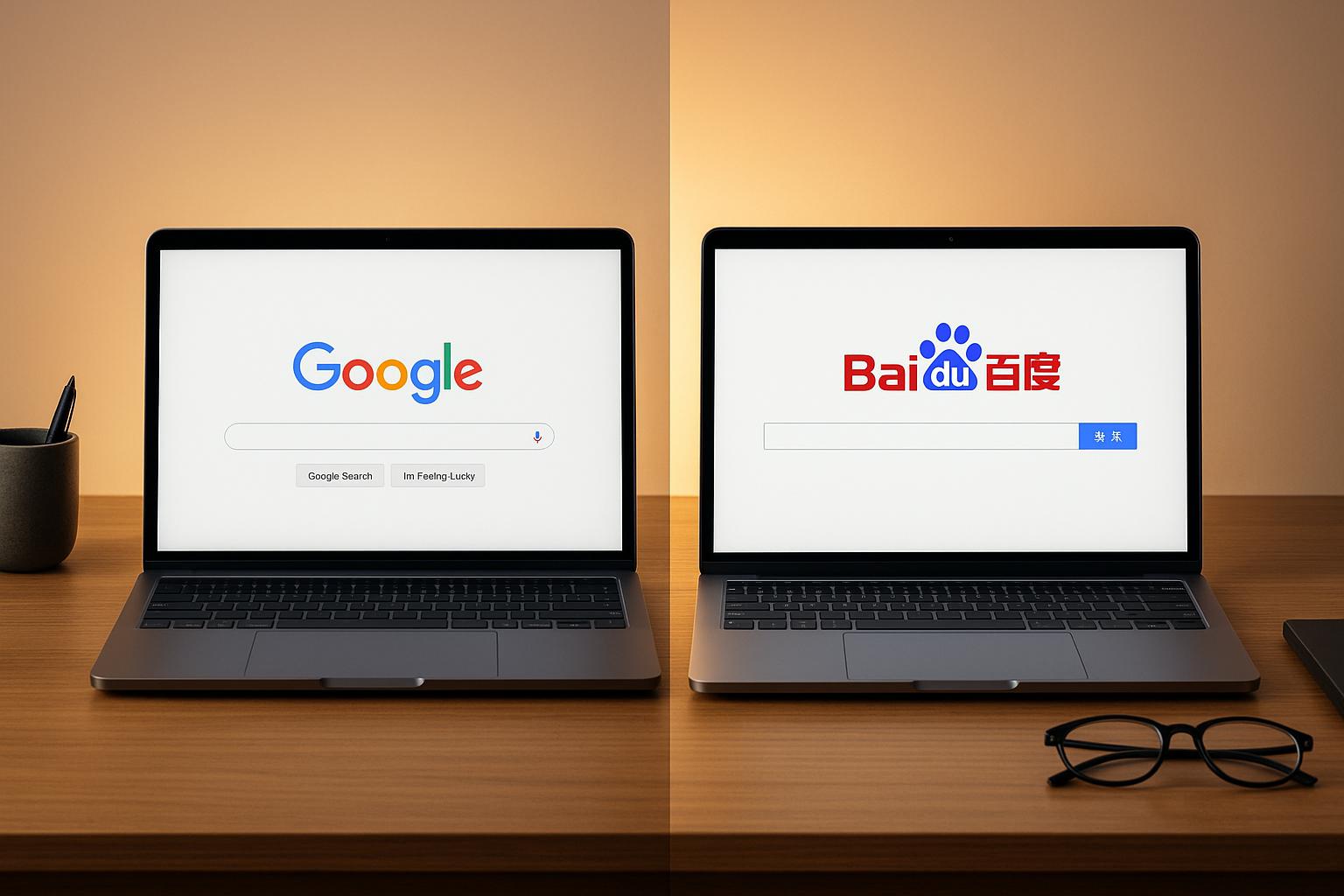If you’re targeting both global and Chinese markets, you can’t use the same SEO strategy for Baidu and Google. Why? These two search engines operate very differently. Here’s what you need to know:
Quick Takeaways:
- Baidu dominates China with ~60% market share. Google leads globally with 92%.
- Hosting matters for Baidu: Sites must be hosted in Mainland China with an ICP license.
- Technical differences: Baidu struggles with JavaScript and relies on plain HTML, unlike Google.
- Content focus: Baidu prioritizes Simplified Chinese and shorter meta tags.
- User behavior: Baidu users prefer mobile-first, content-heavy designs; Google users favor minimalist layouts.
Quick Comparison Table:
| Aspect | Baidu | |
|---|---|---|
| Market Share | ~60% in China | ~92% globally |
| Hosting | Requires Mainland China hosting + ICP | No location restrictions |
| JavaScript Support | Limited | Advanced |
| Language | Simplified Chinese | Multi-language support |
| Meta Title Limit | 27 Chinese characters | 50-60 characters |
| Crawl Speed | 5–7 days | Minutes to hours |
| Mobile Usage | 99.6% | Mix of mobile and desktop |
| Content Restrictions | Strict censorship | Minimal moderation |
To succeed, align your SEO strategy with each platform’s unique requirements. For Baidu, prioritize local hosting, Simplified Chinese content, and compliance with Chinese regulations. For Google, focus on user experience, multilingual support, and advanced technical capabilities.
Baidu SEO: How to do SEO in China. An interview with SEO Zac

Technical SEO Requirements
Baidu and Google operate with distinct technical needs, particularly when it comes to hosting and indexing. Understanding these differences is key to optimizing for each platform.
Hosting and Server Setup
When it comes to Baidu, hosting location is a major factor. Unlike Google, which offers flexibility in hosting globally, Baidu strongly favors websites hosted within Mainland China. Additionally, Baidu enforces a requirement for an Internet Content Provider (ICP) license for any site hosted in China.
| Requirement | Baidu | |
|---|---|---|
| Server | Must be within Mainland China | No geographic preference |
| Loading Speed | Optimized for fast performance in China | Global CDN networks accepted |
| Domain Extension | .cn preferred | All extensions treated equally |
| Hosting License | ICP license required | No special licenses needed |
| CDN Requirements | China-based CDN recommended | Global CDN networks accepted |
These hosting preferences reflect Baidu’s emphasis on local infrastructure, which contrasts with Google’s more global approach.
Website Indexing Methods
The way Baidu and Google index content also varies significantly. Their approaches to handling JavaScript, structured data, and mobile optimization reveal key differences.
| Indexing Feature | Baidu Approach | Google Approach |
|---|---|---|
| JavaScript Processing | Limited support | Advanced processing capabilities |
| Structured Data | No schema.org support | Full schema.org support |
| Mobile Optimization | App transcoding available | Mobile-first indexing |
| Language Support | Primarily focused on Chinese | Multi-language support |
| Crawl Frequency | Can be influenced through marketing and PR | Algorithm-determined |
To meet the technical demands of both platforms, consider these practical steps:
- Content Delivery: Use plain HTML for critical content, as Baidu struggles with advanced JavaScript rendering.
- Mobile Optimization: Ensure that mobile and desktop versions provide identical content.
- Resource Access: Make sure crawlers can access CSS and JavaScript files without restrictions.
For websites aiming to perform well in both markets, server-side rendering is a smart choice. This approach ensures that content remains accessible, especially given Baidu’s limited JavaScript processing compared to Google’s more advanced capabilities. Additionally, maintaining clean, efficient code structures can improve crawling efficiency and indexing on both platforms.
Content Rules for Each Platform
Meta Tags and Keyword Usage
When crafting meta tags, it’s essential to adapt to the specific limits of each search engine. Baidu, for instance, restricts title tags to 27 Chinese characters (or 54 Latin characters), while Google allows slightly longer titles, ranging from 50 to 60 characters. As for meta descriptions, Baidu caps them at 108 characters, whereas Google extends the limit to 156 characters.
| Meta Element | Baidu | |
|---|---|---|
| Title Tag Length | 27 Chinese chars (54 Latin) | 50-60 chars |
| Meta Description | 108 chars | 156 chars |
| Meta Keywords | Not a ranking factor | Not a ranking factor |
| Keyword Placement | Beginning of title critical | Natural placement |
Keyword placement strategies also differ significantly. Baidu places a strong emphasis on positioning keywords at the beginning of the title for better rankings. On the other hand, Google’s algorithm prioritizes understanding user intent over the exact placement of keywords. Once your meta tags are optimized, it’s time to focus on language settings for enhanced regional targeting.
Language and Regional Settings
Language settings are a key factor in improving visibility on search engines. Baidu, which dominates over 70% of China’s search market, gives priority to content written in Simplified Chinese. Google, with its 90% global market share, supports diverse languages and uses advanced targeting tools to deliver localized results.
Here’s how to optimize for each platform:
- Use Pinyin, English, or numbers in URLs when targeting Baidu.
- Create original Simplified Chinese content for better rankings on Baidu.
- Implement hreflang tags to help Google target users in specific languages.
"People appreciate content written in their preferred languages, and Google itself would like to show it when it is available".
Once language settings are in place, focus on optimizing media assets to meet platform-specific requirements.
Image and Media Standards
Image optimization is another crucial area, as images account for 38% of webpage weight on mobile. The requirements for image optimization vary between Baidu and Google.
| Aspect | Baidu Requirements | Google Requirements |
|---|---|---|
| File Format | Standard web formats | BMP, GIF, JPEG, PNG, WebP, SVG, AVIF |
| Alt Text | Chinese characters | Descriptive text |
| Image Context | Relies on surrounding text | Computer vision + page context |
| File Names | Pinyin/English recommended | Descriptive names preferred |
Google uses advanced computer vision technology alongside page content to interpret images. Baidu, however, relies more heavily on the surrounding text and specific character patterns. To optimize effectively, balance file size and image quality while adhering to platform-specific naming conventions. With images appearing in 36.7% of Google search queries, proper optimization can significantly impact visibility.
Legal Requirements and Rules
Staying compliant with legal regulations is a critical part of SEO success, as it influences both content strategies and technical setups on platforms like Baidu and Google.
Content Filtering Rules
Baidu operates under China’s ‘Great Firewall,’ enforcing over 60 state-mandated restrictions that directly affect SEO strategies and content visibility. These strict rules contrast sharply with Google’s more lenient approach.
| Aspect | Baidu Requirements | Google Requirements |
|---|---|---|
| Content Restrictions | Strict political/religious censorship | Minimal moderation |
| Content Removal | Automated filtering with manual review | Manual review based on policies |
| Keyword Restrictions | Extensive blocked keyword list | Minimal keyword restrictions |
| Self-Censorship | Mandatory compliance | Platform guidelines |
On Baidu, content that violates these restrictions is swiftly removed. This level of enforcement means businesses must carefully plan their content and continuously monitor compliance.
"The Chinese government has described censorship as the method to prevent and eliminate ‘risks in the ideological field from the Internet’".
In addition to content filtering, privacy and security protocols on both platforms play a significant role in shaping SEO strategies.
Privacy and Security Standards
Privacy and security requirements differ greatly between Baidu and Google. Baidu adheres to China’s cybersecurity mandates, while Google follows international privacy frameworks.
In March 2025, Baidu introduced an anti-unauthorized data access alliance, supported by a cybercrime prevention fund. On the other hand, Google maintains a robust set of privacy certifications, including:
- SOC 1/2/3 certifications
- ISO 9001, ISO/IEC 27001, 27701, 27017, 27018, and 42001
- FedRAMP High authorization
| Security Aspect | Baidu | |
|---|---|---|
| Data Processing | Limited transparency | Clear processing guidelines |
| User Consent | Real-name system required | Opt-in consent model |
| Encryption Standards | Limited disclosure | Comprehensive documentation |
| Regulatory Framework | China-specific regulations | International standards |
For businesses targeting both platforms, adopting dual compliance strategies is essential. Baidu, for example, scored ninth in the 2025 Big Tech Edition with a transparency score of 33%. Meanwhile, Google emphasizes data protection through tools like its Cloud Data Processing Addendum (CDPA).
"Your interactions with Gemini stay within your organization. Gemini does not share your content outside your organization without your permission." – Google Workspace Admin Help
SEO Checklist: Baidu vs. Google
Baidu and Google rely on different technical factors to rank websites, making it crucial to tailor your SEO strategy depending on the platform.
Technical Requirements Table
Here’s a breakdown of the key technical differences between Baidu and Google:
| Technical Element | Baidu Requirements | Google Requirements |
|---|---|---|
| Server Location | Hosting in mainland China is required | No specific location needed |
| Domain Type | Prefers .cn domains |
Supports all TLDs |
| Loading Speed | Must load quickly | Fast loading is recommended |
| Mobile Optimization | Essential | Important but more flexible |
| JavaScript Support | Limited | Fully supported |
| Indexing Speed | Typically 5–7 days | Hours or even minutes |
| SSL Certificate | Mandatory | Mandatory |
| Site Architecture | Flat structures are preferred | Supports deep structures |
| Crawl Budget | Limited allocation | More generous allocation |
Hosting your site in mainland China significantly improves loading times on Baidu, sometimes by as much as 200% compared to international hosts.
When it comes to content, the two platforms also demand different approaches.
Content Guidelines Table
Here’s how Baidu and Google differ in content-related requirements:
| Content Element | Baidu | |
|---|---|---|
| Primary Language | Simplified Chinese is mandatory | Supports multiple languages |
| Title Character Limit | Maximum of 27 Chinese characters | 60–70 characters |
| Meta Description | 108 characters max | 155–160 characters |
| Meta Keywords | Still a ranking factor | Not used for ranking |
| Content Length | 500–800 Chinese characters | 300–1,000 words |
| Image Alt Text | Should be in Chinese | Any language is acceptable |
| URL Structure | ASCII characters only | Supports Unicode |
| Structured Data | Does not support schema.org | Full schema.org support |
Unlike Google, Baidu struggles with modern web technologies, making plain HTML a better choice for indexing.
"Baidu is a Chinese search engine, made by Chinese, and used by Chinese…Baidu understands the Chinese people." – Archana Patel
Given Baidu’s 54% market share across devices in China, adhering to its specific guidelines is essential for businesses aiming to succeed in the Chinese market.
This checklist underscores the importance of creating tailored SEO strategies for each platform, ensuring compliance with their unique requirements.
Conclusion: Platform-Specific SEO Plans
To succeed in global SEO, you need to tailor your strategy to the unique demands of Baidu and Google. With Baidu commanding 80.33% of China’s search market and Google dominating 91% of searches in the U.S., a one-size-fits-all approach simply won’t work.
Baidu SEO Requirements
Baidu’s SEO success hinges on meeting specific local regulations and technical standards. To thrive on this platform, businesses must:
- Secure an ICP license, which is mandatory for hosting websites in mainland China.
- Provide professionally translated content in Simplified Chinese to resonate with local users.
- Focus on precise keyword targeting, as Baidu’s natural language processing is less advanced than Google’s.
Additionally, mobile optimization is a must. Baidu’s Mobile Instant Pages (MIP) framework ensures faster load times and better performance on mobile devices, making it a key part of any China-focused strategy.
Google SEO Requirements
Google’s algorithm places a premium on user experience and high-quality content. To rank well, businesses should:
- Emphasize E-E-A-T (Experience, Expertise, Authoritativeness, and Trustworthiness) by creating valuable and credible content.
- Design mobile-first websites and produce content that aligns with user intent.
- Secure their sites with HTTPS protocols for better security and trustworthiness.
Google’s advanced technology also supports more sophisticated features like JavaScript-heavy websites and dynamic content, which contrasts with Baidu’s more limited crawling capabilities. While Google emphasizes global accessibility and multilingual support, Baidu focuses on local relevance and strict compliance with Chinese regulations.
To succeed in both markets, businesses must fully understand these differences and adjust their strategies to meet the specific requirements of each platform.
FAQs
Why do you need hosting in Mainland China and an ICP license to succeed with Baidu SEO?
If you’re aiming for strong SEO performance on Baidu, hosting your website in Mainland China and securing an ICP (Internet Content Provider) license are non-negotiable steps. The ICP license is a legal requirement for sites hosted on Chinese servers, ensuring your website complies with local laws. Without this license, hosting your site in China isn’t an option, which can result in slower load times and reduced accessibility – two factors that Baidu heavily considers in its rankings.
On top of that, local hosting significantly boosts your site’s performance for users in China. It minimizes latency, improves load speeds, and aligns with Baidu’s preference for fast, regulation-compliant websites. Together, these actions are essential for improving your visibility on Baidu and effectively engaging with your audience in China.
How does Baidu’s limited support for JavaScript affect website design compared to Google?
Baidu faces challenges when it comes to processing JavaScript, which can directly impact how websites are built for its search engine. While Google is capable of crawling and indexing JavaScript-heavy content effectively, Baidu often struggles with such sites. This means websites that rely heavily on JavaScript may have reduced visibility in Baidu’s search results.
To improve performance on Baidu, developers should prioritize static HTML and limit the use of JavaScript. This makes it easier for Baidu to crawl and index the content. In contrast, Google’s capabilities allow for more dynamic and interactive website designs, offering developers greater freedom in both functionality and aesthetics.
How can businesses adapt to Baidu’s strict content regulations for effective SEO in China?
To make headway with Baidu SEO, businesses need to carefully adhere to China’s strict content rules. The first step? Secure an ICP license – this is a must-have for hosting any content within the country. Next, ensure your content steers clear of sensitive subjects or banned materials, keeping everything in line with local regulations. Writing in simplified Chinese is another key move, as it helps you connect with the local audience and boosts your visibility in Baidu’s search results. Stay proactive by regularly updating your site to meet Baidu’s changing standards. Lastly, teaming up with local SEO professionals can be a game-changer, helping you remain compliant and fine-tune your approach to Baidu’s unique ecosystem.




